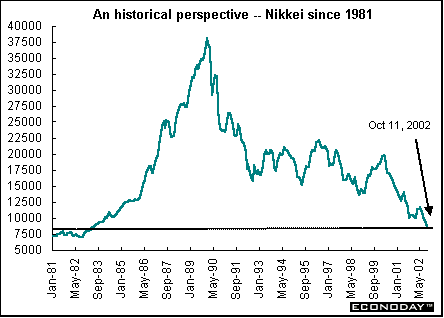Monday, October 14, 2002

Three central banks met last week and none changed policy. The Bank of England left its key interest rate unchanged at 4 percent. The European Central Bank left its rate at 3.25 percent despite weak growth especially in Germany. Finally, the Bank of Japan kept monetary policy unchanged. The BoJ said it would continue to keep its target of current account deposits at ¥10 to ¥15 trillion, but reiterated that it would provide ample liquidity irrespective of targets if risks to the stability of the financial system appear.
In a sign that the BoJ may work together with the government to write off a sea of bad loans, the Bank said it would buy ¥2 trillion ($16 billion) of shares from banks and urged the government to use taxpayer money. BoJ Governor Masaru Hayami called for banks to properly set aside provisions for bad debts, estimated at ¥52 trillion. The central bank is ready to grant emergency loans and buy stocks to limit losses that have eroded banks' capital. All the talk of bad loans sent the Nikkei to new 19-year lows.

Equity volatility continued with swings correlated to the unfolding of
third-quarter earnings and to escalating noises over Iraq. Investors are
edgy everywhere. The temporary end to the west coast dock lockout eased
fears about the impact on overseas economies. In the United States, stock
indexes rose and fell as earnings reports were released for major companies.
On the week, seven indexes rose from 8 percent (Frankfurt DAX) to 0.4
percent (Singapore Straits). Six indexes declined anywhere from 0.4 percent
(Mexican Bolsa) to 9.7 percent (South Korean Kospi).

